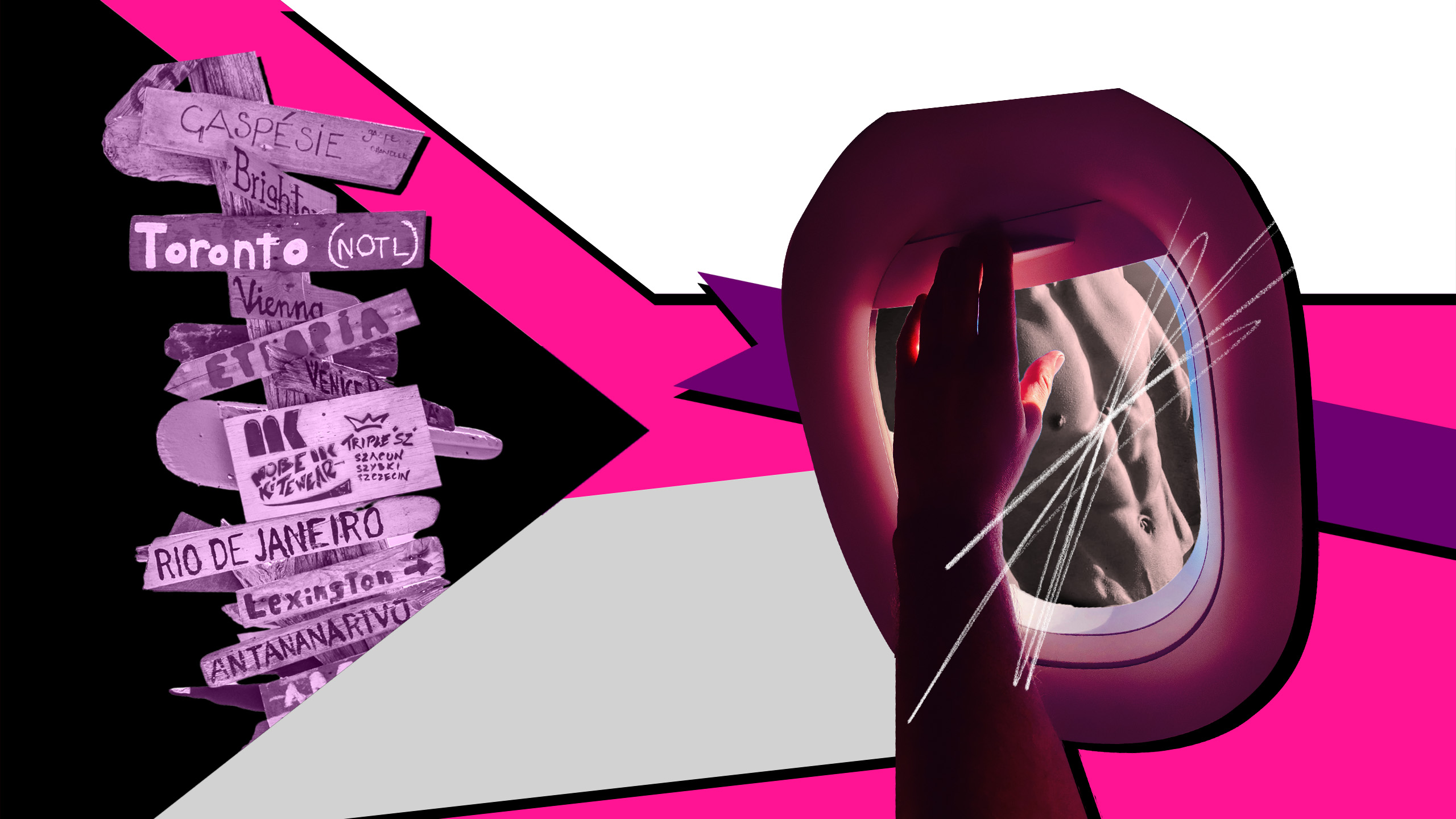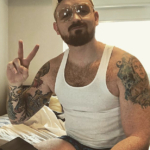My vacation was months in the making. After barely surviving my first gay breakup in August 2021, I began planning a trip that would signify my re-entry to the world of singledom. My recent ex was my first serious boyfriend, and I had only been out for a year prior to meeting him. It had taken months of therapy and buckets of tears to admit that I still needed to experience things that I could only do while single; one of which was to broaden my sexual portfolio. I’d ended our relationship because I needed more.
So as I prepared to head to Mexico, I felt like a giddy debutant. Only it wouldn’t be my father presenting me at this ball, but a legendary drag queen from Toronto, who asked me to keep her company during a month-long residency at a popular hotel in Puerto Vallarta, a hedonistic hub of homosexuality.
I spent the overnight flight in a melatonin-induced haze, fantasizing about the steamy sexual encounters I’d soon be having with men whose names I wouldn’t remember come morning. But this fantasy floundered when I attended my first pool party on day two. Since my friend and I had arrived during BeefDip, a week-long event celebrating muscular, heavy-set men and their admirers, the party was packed. There were crowds of massive, hairy men in the pool, at the bar, on the bar, in the cabanas and everywhere connecting these areas. Visually, it was everything I dreamed of and yet … I didn’t want to be there.
As I surveyed the crowd, I felt inferior and unattractive, which sent my mind reeling with a flurry of anxious questions: Who would want me when there are countless other men to choose from? Why haven’t these cocktails given me the liquid courage I so desperately needed? Who the hell am I? Should I reapply my sunscreen?
After shotgunning a beer to save time, I left. On my way out, I locked eyes with someone I’d been chatting with on Grindr earlier that day. Feeling the effects of this latest beverage (and heeding my friend’s advice to be more forward), I said hello, we exchanged numbers and, to my surprise, some saliva. I walked back to the hotel with a big smile on my face, suddenly cured of any insecurities.
We agreed to meet later that night. After a long evening of partying, kissing and surprisingly personal conversations, he brought me back to his hotel, grabbed me a drink, a bathing suit and took me to the rooftop. We spent hours talking, watching the stars and listening to the echoes of boozy partygoers. We had sex as the sun rose.
I will admit that after the pool party, I didn’t think I would find someone like him on this trip. Someone who was willing to take the time to get to know me, to ask what I needed and to genuinely be attracted to me in more than a physical way. Our date marked the first time I felt truly comfortable on the trip. Until then I’d only had in-app conversations with guys who wanted to fool around in bathroom stalls, or the 20-minute window their roommate was down by the pool or getting food.
We more or less followed the same schedule the following evening. Only this time, the conversation got more intense. A little too intense. He wanted to fly me to Chicago. He said he could see a future with me. He went as far as to say he could see himself marrying me. I knew he’d been drinking, so I chuckled and brushed it off, but I’ll admit that part of me was turned on by the fantasy.
The pool party offered an unexpected revelation: faced with an opportunity to have sex with multiple people, I chose to seek out intimacy with someone new instead. I don’t judge others for their more casual approach to sex. In fact, I encourage it. If anything, I wish I were more like them. But alas, I’m a lover, not a fucker.
The afternoon following my initial hookup, I googled and read aloud what demisexuality meant as my friend applied makeup for a gig that evening. “That’s you,” he said without hesitation.
I had a difficult time accepting this about myself. It reminded me that I still felt conflicted about exactly what I wanted and needed out of sexual relationships. I’d broken up with my boyfriend because I felt like I hadn’t taken the time to know who I was as a queer person—and, with the guidance of my therapist, I’d decided exploring things on my own was the best way to get a better sense of self.
Before my breakup, I’d fantasized about all the sexual scenarios I would have if I were single again. But here I was, in Mexico, seeking intimacy. The trip confirmed that my raunchy fantasies were much more appealing in theory than in practice, because I don’t experience sexual attraction the same way as many of my peers: I need to get to know someone intimately before I can consider jumping into bed with them.
It can be difficult to find somebody who is willing to take the time to get to know you before sex, since sex can be so easy and transactional, especially in a place like a Puerto Vallarta cruising party. I missed my ex, and started to regret my choice.
I decided that, to understand myself better, I needed to get a better grasp on demisexuality, so I turned to the experts.
“Demisexuality is defined as only experiencing sexual attraction to someone after you’ve formed an emotional connection with them,” sex educator Cassandra Corrado explains. “It’s an identity underneath the asexual umbrella, which is made up of a bunch of different things. Many folks under the ace umbrella still have sex—behaviour is different from identity.”
When I interviewed Corrado, a demisexual herself, I explained that my sexual appetite is not something I’d consider even close to asexual.
“People often assume that demisexual people are prudes or frigid, but the reality is that demisexual folks just experience different thresholds or have different needs before sexual attraction can happen,” she says. “I often hear folks say things like, ‘Isn’t this how everyone is?’ and the answer to that is no.”
As I chatted with Corrado, I explained that I have strict sexual boundaries, which is something I can more effectively communicate with somebody I’ve gotten to know better. I shared that I’ve also had physically traumatic sexual experiences, so getting to know somebody on a personal level before having sex helps me feel more comfortable.
“I would differentiate between ‘wanting to have sex,’ and ‘being sexually attracted to someone,’” Corrado advises. “Someone might be allosexual, meaning you experience sexual attraction for other people (an antonym to asexual), but also be uninterested in sex without an emotional connection—that would be a boundary or need for them. They might know they are sexually attracted to someone, and just not want to act on it until that connection has been formed.”
Taking Corrado’s words to heart, I had to figure out if an emotional connection was more of a requirement, or a preference. She recommended I begin journaling, asking questions like: What does an emotional connection do for me, sexually? Does it help me feel safer and more authentic? Does it unlock a new layer to my connection with someone or make way for sexual attraction? What’s the relationship for me between emotions and sexual attraction?
I quickly realized these questions aren’t something I can easily answer. But here’s what I do know: I don’t enjoy sex with somebody I haven’t gotten to know well, and generally avoid those scenarios. Whether I do this out of necessity, or if it’s a boundary, is something I can only find out through more experiences and introspection.
Still, as emotionally exhausting as it sounds, I managed to have fun with a few men I met on that trip; who were open to going on no-strings dates during my stay and watching Drag Race after we came.
While it’s not what I set out to do (which, again, was to have sex with many, many men), I came home with something more valuable: a better sense of self. Am I demisexual? I might be, but I’m not entirely sure yet. I’ve always had a difficult time labelling my sexuality, and have come to realize it’s perfectly okay if some identifiers are temporary or fluid. I’ve identified as bisexual, gay and queer in the past, and for now, identifying as a queer demisexual feels fitting.
Some say labels are silly and redundant in 2022, but I’d argue that they serve a valuable purpose: demisexuality provided light when I was in an emotionally disorienting place. This label offered understanding, and, in talking with Corrado, a sense of community.
As I’ve had time to settle into this label, I’ve realized there’s beauty in knowing and accepting that my sexuality may never be static or easily defined. For now, I’m comfortable with this uncertainty, and I’m excited to see where things go—with evolving, maturing and gleaning new insight into who I am.


 Why you can trust Xtra
Why you can trust Xtra


